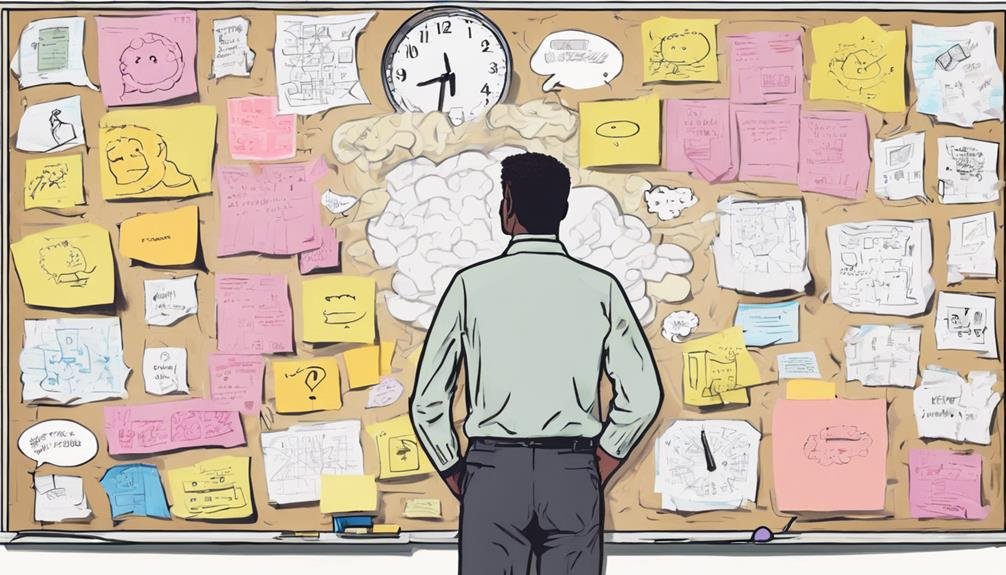
You're likely no stranger to stress, with the demands of modern life often pitting your personal and professional responsibilities against each other in a constant battle for balance. To regain control, start by identifying the sources of your stress, whether it's workplace pressure, relationships, or unrealistic expectations. Regular physical activity, such as outdoor exercise or group fitness, can also help alleviate stress. Additionally, practices like mindfulness, meditation, and healthy sleep habits can work wonders for your mental well-being. By implementing these techniques, you'll be better equipped to manage stress and achieve a balanced life – and there's more to explore to help you get there.
Key Takeaways
- Recognize workplace pressures as a significant contributor to stress and identify specific tasks or situations that trigger feelings of overwhelm.
- Regular physical activity, such as outdoor exercise or group fitness, can reduce anxiety and improve sleep, aiming for at least 30 minutes per day.
- Mindfulness and meditation techniques, like guided imagery or breath awareness, can improve resilience and coping with stress with just a few minutes of practice each day.
- Establishing healthy sleep habits, including a consistent sleep schedule and relaxing bedroom environment, can boost physical and mental well-being.
Identifying Sources of Stress

To effectively manage stress, you'll need to identify the sources that trigger it in your life, whether it's a demanding job, a strained relationship, or an unhealthy habit. Recognizing workplace pressures is crucial, as they can be a significant contributor to stress. Take note of your work environment, workload, and interactions with colleagues and supervisors. Are there specific tasks or situations that make you feel overwhelmed or anxious? Identifying these triggers will help you develop strategies to cope with them.
Managing relationship difficulties is also essential. Strained relationships with family, friends, or romantic partners can be a significant source of stress. Reflect on your relationships and consider whether there are any patterns or conflicts that need to be addressed. Are there communication issues or unrealistic expectations that need to be resolved? By acknowledging and addressing these relationship difficulties, you can work towards resolving them and reducing stress.
Physical Activity for Stress Relief
Engaging in regular physical activity is one of the most effective ways you can manage stress and improve your overall well-being. When you exercise, your body releases endorphins, which are natural mood-boosters that help alleviate stress and anxiety. You don't have to be a fitness enthusiast to reap the benefits of physical activity. Even moderate exercise, such as brisk walking or cycling, can make a significant difference.
| Physical Activity | Benefits |
|---|---|
| Outdoor Exercise (e.g., hiking, jogging) | Exposure to natural light and fresh air can boost mood and reduce stress |
| Strength Training (e.g., weightlifting, bodyweight exercises) | Increases muscle mass and bone density, reducing anxiety and improving sleep |
| Group Fitness (e.g., team sports, fitness classes) | Social interaction and camaraderie can enhance mood and reduce feelings of loneliness |
Incorporating physical activity into your daily routine can have a profound impact on your mental health. Aim for at least 30 minutes of moderate exercise per day, and explore different activities to find what works best for you. By making physical activity a priority, you'll be better equipped to manage stress and maintain a balanced life.
Mindfulness and Meditation Techniques

Practicing mindfulness and meditation techniques can be a powerful complement to physical activity in reducing stress and improving your mental well-being. By incorporating these practices into your daily routine, you can develop greater self-awareness, clarity, and emotional regulation.
One effective technique is guided imagery, which involves using visualization to create a peaceful and relaxing environment. This can be done by listening to guided recordings or creating your own scenarios.
Another technique is breath awareness, which involves focusing on your breath to calm your mind and body. This can be done by paying attention to the sensation of the breath moving in and out of the body, or by using a mantra to anchor your attention.
Regular mindfulness and meditation practice can help you develop a greater sense of resilience and better cope with stress. By committing to just a few minutes of practice each day, you can experience the many benefits of mindfulness and meditation for yourself. With consistent practice, you can improve your mental well-being and enhance your overall quality of life.
Healthy Sleep Habits for Men
Establishing healthy sleep habits is crucial for men, as it can significantly impact their physical and mental well-being, and getting enough quality sleep can be the key to unlocking improved stress management, increased energy, and enhanced overall health.
You can start by implementing sleep hygiene practices, such as maintaining a consistent sleep schedule, creating a relaxing bedtime routine, and avoiding stimulating activities before bedtime. Establishing wind down routines can also help signal to your brain that it's time to sleep. This can include activities like reading a book, taking a warm bath, or practicing gentle stretches.
Additionally, you can optimize your sleep environment by ensuring your bedroom is dark, quiet, and at a comfortable temperature. Consider investing in a comfortable mattress and pillows to promote better sleep. Avoid screens and electronic devices before bedtime, as the blue light emitted can interfere with your body's production of melatonin, a hormone that regulates sleep.
Effective Time Management Strategies

By getting a handle on your sleep habits, you've taken the first step towards managing stress, but now it's time to optimize your daily routine with effective time management strategies that help you prioritize tasks, minimize distractions, and make the most of your waking hours.
To achieve a better work life balance, start by identifying your most important tasks and focus on completing them first. Use a planner, calendar, or app to stay organized and on track.
Set specific goals for each day and break them down into smaller, manageable tasks. This will help you stay focused and avoid feeling overwhelmed.
Conclusion
As you close this guide, remember that stress reduction is a journey, not a destination.
By incorporating physical activity, mindfulness, and effective time management into your daily routine, you'll be better equipped to navigate life's twists and turns.
With healthy sleep habits as your anchor, you'll stay grounded and focused.
Take control of your well-being and watch your life transform into a symphony of balance and harmony.
